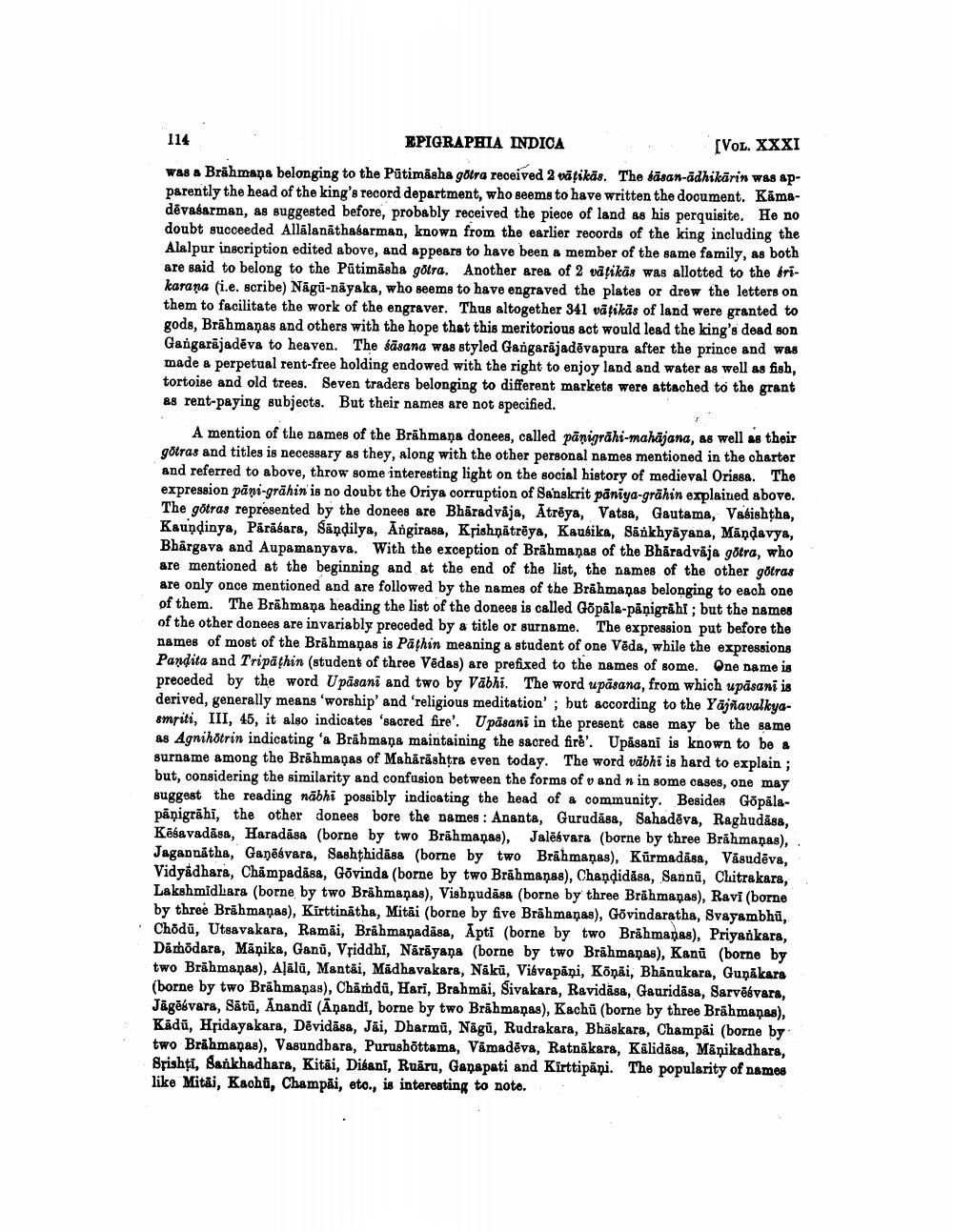________________
EPIGRAPHIA INDICA
[Vol. XXXI
was a Brāhmana belonging to the Pūtimasha götra received 2 vātikās. The basan-adhikarin was apparently the head of the king's record department, who seems to have written the document. Kámsdēvasarman, as suggested before, probably received the piece of land as his perquisite. He no doubt gucceeded Allalanāthasarman, known from the earlier records of the king including the Alalpur inscription edited above, and appears to have been a member of the same family, as both are said to belong to the Putimäsha götra. Another area of 2 vacikäs was allotted to the trikarana (i.e. scribe) Nägu-nayaka, who seems to have engraved the plates or drow the letters on them to facilitate the work of the engraver. Thus altogether 341 väfikas of land were granted to gods, Brāhmaṇas and others with the hope that this meritorious act would lead the king's dead son Gangarājadēva to heaven. The sāsana was styled Gangarājadēvapura after the prince and was made a perpetual rent-free holding endowed with the right to enjoy land and water as well as fish, tortoise and old trees. Seven traders belonging to different markets were attached to the grant as rent-paying subjects. But their names are not specified.
A mention of the names of the Brāhmaṇa donees, called pānigrāhi-mahājana, as well as their gotras and titles is necessary as they, along with the other personal names mentioned in the charter and referred to above, throw some interesting light on the social history of medieval Orissa. The expression pāri-grāhin is no doubt the Oriya corruption of Sanskrit paniya-grähin explained above. The gotras represented by the donees are Bhāradvaja, Ātrēya, Vatsa, Gautama, Vasishtha, Kaundinya, Päräsara, Sandilya, Angirasa, Krishņātrēya, Kausika, Sankhyāyana, Mandavya, Bhargava and Aupamanyava. With the exception of Brāhmaṇas of the Bhāradvāja götra, who are mentioned at the beginning and at the end of the list, the names of the other gotras are only once mentioned and are followed by the names of the Brāhmaṇas belonging to each one of them. The Brāhmana heading the list of the donees is called Gopāla-pānigråhi; but the names of the other donees are invariably preceded by a title or surname. The expression put before the names of most of the Brāhmaṇas is Pathin meaning a student of one Vēda, while the expressions Pandita and Tripāțhin (student of three Vēdas) are prefixed to the names of some. One name is preceded by the word Upāsani and two by Vābhi. The word upasana, from which upāsani is derived, generally means 'worship' and 'religious meditation' ; but according to the Yājsavalkyasmriti, III, 45, it also indicates 'sacred fire'. Upasani in the present case may be the same as Agnihotrin indicating 'a Brāhmaṇa maintaining the sacred fire'. Upåsani is known to be a surname among the Brāhmaṇas of Mahārashtra even today. The word vābhi is hard to explain ; but, considering the similarity and confusion between the forms of v and n in some cases, one may suggest the reading näbhi possibly indicating the head of a community. Besides Göpälapānigrāhī, the other donees bore the names : Ananta, Gurudāsa, Sahadēva, Raghudāsa, Kēšavadāsa, Haradása (borne by two Brāhmaṇas), Jalēsvara (borne by three Brāhmaṇas), Jagannatha, Ganēsvara, Sashthidasa (borne by two Brahmanas), Kurmadása. Vasudeva. Vidyadhara, Châmpadasa, Govinda (borne by two Brahmanas), Chandidāsa, Sannü, Chitrakara, Lakshmidlara (borne by two Brāhmaṇas), Vishnudāsa (borne by three Brāhmaṇas), Ravi (borne by three Brähmanas), Kirttinátha, Mitai (borne by five Brāhmaṇas), Govindaratha, Svayambhū, Chodu, Utsavakara, Ramai, Brahmanadása, Apti (borne by two Brahmanas), Priyankara, Damodara, Mānika, Ganů, Vriddhi, Nārāyana (borne by two Bråhmanas), Kanu (borne by two Brāhmanas), Alälu, Mantâi, Madhavakara, Näkü, Visvapāņi, Könãi, Bhanukara, Gunākars (borne by two Brāhmaṇas), Chamdü, Hari, Brahmãi, Sivakara, Ravidasa, Gauridāsa, Sarvēsvara, Jaqēkvara, Sätü, Anandi (Anandi, borne by two Brahmanas), Kachū (borne by three Brāhmaṇas), Kādū, Hridayakara, Dévidāsa, Jāi, Dharmū, Nāgū, Rudrakara, Bhaskara, Champai (borne by two Brahmanas), Vasundbara, Purushottama, Vamadēva, Ratnākara, Kálidāsa, Mānikadhara, Spishti, Sankhadhara, Kitai, Disani, Ruāru, Ganapati and Kirttipāņi. The popularity of names like Mitai, Kachū, Champai, eto., is interesting to noto.




